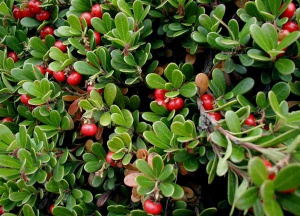Uva Ursi
Contents
Origin & Description
Uva Ursi is an evergreen bush that was originally found growing in the wild in Europe, North America and Asia. Today it can be found in many areas all over the world. Small pink flowers make this herbal plant very appealing to the eye, along with its bright red berries which grace its branches in the summer months.
Other common names for this herb are bearberry, kinnikinnick (American Indian name), upland cranberry and bear's grape. The leaves are most used for their medicinal properties.
Constituents & Actions
Uva Ursi is an astringent, disinfectant, diuretic (increases the secretion and flow of urine), lithontriptic (dissolves urinary calculi/stones), sedative (renal), stimulant (mild), urinary antiseptic and tonic. The main constituent of its leaves is a glycoside called arbutin, which gives it diuretic action. This arbutin is excreted by the kidneys and produces an antiseptic effect of the urinary mucous membrane.
Tannic acid is not only contained in the leaves of the Uva Ursi plant, but also in the berries. This herb also helps balance the pH of urine that is highly acidic, and contains allantoin which promotes the healing of wounds.
Medicinal Uses
Historically, Uva Ursi has been used by the Chinese, Europeans and American Indians as a kidney healing herb. Both leaves and berries were used for the treatment of bladder infections, kidney stones, incontinence and similar ailments. American Indians mixed the leaves with tobacco to create the smoking medicine kinnikinnick.
Uva Ursi strenghtens the urinary passages and assists with inflammation in the urinary system. It stimulates kidney activity and if very effective for treating blood in the urine. As a sedative, it it soothing to the walls of the bladder, toning and decreasing excessive discharges. It also acts as a cleanser for the spleen.
This valuable herb can help control excess sugar in the blood, therefore being an asset in the treatment of diabetes. As an antibiotic, it is helpful in the fight abainst many organisms including Staph and E. Coli. Men have found good results using Uva Ursi for problems relating to inflammation of the prostate.
Among its many uses, this herb's control of inflammation makes it a useful treatment for arthritis. Following are some conditions which improve with the use of Uva Ursi:
- Arthritis
- Bedwetting
- Bladder infections
- Cystitis
- Diabetes
- Female problems
- Gallstones
- Kidney Stones
- Kidney infections
- Liver problems
- Nephritis
- Prostate inflammation
- Spleen problems
- Urinary disorders
- Uterine ulceration
- Vaginal discharge
- Water retention
Side-Effects
Side-effects from Uva Ursi may include nausea and stomach upset. Those suffering with diabetes or alcoholism -related liver disease, should not take this herb. Children and pregnant or breast-feeding women should avoid the use of Uva Ursi.
